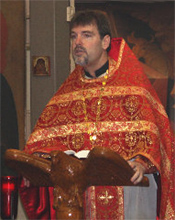
Orthodox preaching needs to be good preaching. To be good, Orthodox preaching must not only deliver good content, but it must strive to make the hearers good. Therefore, good Orthodox preaching is the Gospel (lit., good news) proclaimed and lived.
Four characteristics mark good Orthodox preaching:
- Christ crucified and risen;
- the language, or rationale, of Scripture;
- plain discourse; and
- attention to the experience of salvation through the Gospel.
All Orthodox preachers exhibit these traits beginning with Christ Jesus, the apostles, and the prophets. They only preach what they themselves have come to know.
First, Orthodox preaching is the Word, the Logos incarnate Who was crucified and raised to redeem the world from sin, death, and the power of the devil.
“And I, brethren, when I came to you, did not come with excellence of speech or of wisdom declaring to you the testimony of God. For I determined not to know anything among you except Jesus Christ and Him crucified” (1 Cor. 2:1-2).
Our Lord instructed after the Resurrection:
“Thus it is written, and thus it was necessary for the Christ to suffer and to rise from the dead the third day, and that repentance and remission of sins should be preached in His name to all nations, beginning at Jerusalem” (Luke 24:46-47).
The Gospel encompasses the entire plan of salvation from creation to Second Coming as it hinges on the Cross, Burial, and Resurrection. The preaching of Christ comprises the narrow gate to God’s Kingdom, composed from the Creed, the prayers of the Divine Liturgy, and the Church’s great festal hymns.
So Orthodox preaching is doctrinal preaching, the revelation of the saving Mystery of Christ (cf. 1 Tim. 3:16).
Second, good Orthodox preaching always weaves a tapestry from the language of Scripture. Read the Old Testament prophets, the apostles, and the words of Christ Himself – always alluding to the holy words spoken before. More than that, though, good preaching thinks Scripturally, not just verbally quoting the Scripture, but with the rationale of the Holy Spirit.
Preaching has to make sense. Words have to match reality, hence, the constant use of Scripture which is an unfailing guide to the Truth of God and man. The preacher must know the Scriptures and be prepared to apply their truths in a proper, logical way.
Third, the proclamation of the Gospel should take place with plain discourse. Good preachers get to the point. Fancy expressions and circuitous reasoning transform preaching into a performance, either for entertainment or a demonstration of the orator’s skill; however, neither serve the Gospel well. Of course, Christ taught in parables and used expressions not always, or easily, understood by those who heard Him (cf. Matt. 13:11-13). But Jesus’ language was plain. People knew what He was talking about even if they didn’t always understand. Plain discourse conveys the message that the hearer should understand, and if they don’t, then they should pursue the meaning further.
Thus good preaching connects the Gospel in the language of Scripture to the everyday life of the hearer and addresses the hearer to see his, or her, life in a different way, God’s way. It is a message “for reproof, for correction, for instruction in righteousness” (2 Tim. 3:16). In order to warn, encourage, educate, and edify, Orthodox preaching will state the unequivocal truth with courage, with love, and with certainty in the power of the Gospel by the working of the Holy Spirit.
Fourth, and this is the core of the Orthodox Tradition, good preaching focuses attention on the experience of salvation through the Gospel.
“And with many other words [Peter] testified and exhorted them, saying, ‘Be saved from this perverse generation’” (Acts 2:40).
Does the sermon draw the hearer to purification from passions, to illumination in the knowledge of Christ, and to glorification in the grace of the Holy Spirit? Then, it is good preaching: “to open their eyes, in order to turn them from darkness to light, and from the power of Satan to God, that they may receive forgiveness of sins and an inheritance among those who are sanctified by faith in Me” (Acts 26:18).
There are no human guarantees with preaching. People refused to listen to Christ. The most carefully constructed sermon can still fall on deaf ears. Sometimes the most poorly delivered sermon surprisingly produces the best results.
Precisely here ring the words of the Word, The Preacher:
“Repent, and believe in the Gospel” (Mark 1:15).
Orthodox preaching, ultimately, is all about the results. It expects a change, a transformation, in the hearer as with the speaker. Every good sermon provides not only the who, what, and when of salvation, but also the how(!), leading the recipient to self-examination and realization to utilize the vast array of resources for personal salvation (e.g., the mysteries, services, disciplines, and saints of the Church).
Preaching is a exhortation to follow Christ in His Body, the Church, toward the only life worth living.
Fr. Jonathan Cholcher is the pastor of St. John the Baptist Orthodox Church in Warren, OH.




Excellent piece. I think this describes good Christian preaching in general, not specifically Orthodox preaching. I must admit, I’ve not heard a great many Orthodox sermons and most of them fall far short of the ideal you’ve outlined here, I’m afraid! Mind you, I’ve also heard many hundreds of sermons in Protestant settings and they also fail the test!
It’s a good thing that the Lord takes the weak and the foolish things to shame the wise …
Best
Phil Williams
Good article, Father; a very useful synopsis to weigh our sermons by. I always need to streamline; good to have another reminder. Just a note: Did you mean to put the paragraph before the final sentence in blockquote? It’s not cited; was it just supposed to be part of your essay?
Thanks again.
Fr. David, Good catch! Going to correct it. Thank you!